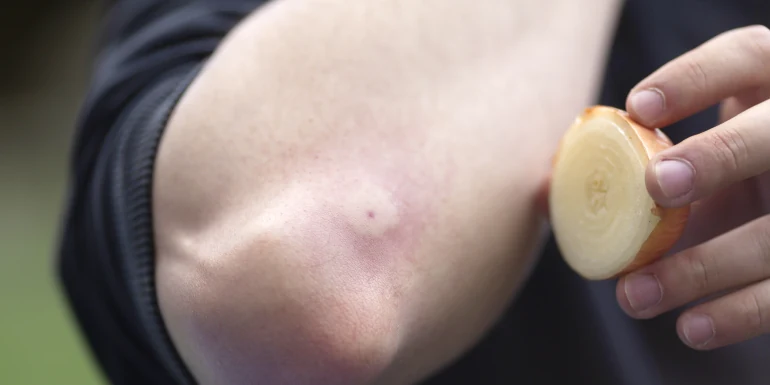
Detection and treatment of mosquito bites
Alas, there’s no summer without mosquitoes – and their itchy bites. Thankfully, numerous home remedies such as onions, vinegar or ginger, special heat sticks and ointments can treat mosquito bites. The most important rule? Treat it! Don’t scratch it!
A mosquito bite can trigger various different reactions. Find out how best to treat it, how to tell the difference between a mosquito bite and a tick bite – and what to do if it becomes inflamed.
Mosquito bite: swelling and itchiness
Why are mosquito bites itchy? When a mosquito bites us, it passes on saliva. This foreign matter, a local anaesthetic and anticoagulant secretion, triggers the release of histamine. Generally speaking, a red circle appears first, then the mosquito bite causes swelling – and the incessantly itchy mosquito bite forms. The site of the bite turns red, swells up, starts to itch and feels warm to the touch. Mosquito bites are harmless and generally disappear by themselves after a few days, but there are exceptions. Caution is advised if a red circle appears around the mosquito bite.
If the tick has already come off, there’s no way of telling whether you have a tick bite or a mosquito bite. Keep an eye on any stings or bites of unknown origin. If they become inflamed or a rash (erythema migrans) appears, you should consult your doctor.
Erythema migrans is a large circular rash that is often paler in the centre that it is at the edge and spreads slowly. It could be a sign of a Lyme disease infection. Another dangerous illness that can be caused by a tick bite is tick-borne encephalitis (TBE).
Tick vaccines offer protection against tick-borne encephalitis (TBE). What you should know about this vaccination:
What helps with mosquito bites?
An itchy mosquito bite might be annoying, but it’s usually harmless. The primary way to relieve itchiness is cooling, ideally with an ice cube or a cold compress. There are also many effective aids such as ointments, heat sticks or home remedies for treating mosquito bites.
The best home remedies for treating mosquito bites
Onions
The juice of an onion has an antiallergic and antibacterial effect. So if you’re bitten by a mosquito, you can halve the onion and dab the bite lightly with it.
Lemons
Lemons have a similar effect to that of onions. They contain essential oils that relive itchiness.
Essential oils
Lavender oil has a calming effect and dripping some on the mosquito bite can help to relieve itchiness. If the mosquito bite is slightly inflamed, tea tree oil is recommended as this prevents inflammation. However, tea tree oil should not be applied to the skin undiluted: mix four drops of tea tree oil into 10 ml of almond or olive oil and then dab on.
Ginger
Hold a few slices of ginger on the bite and wait for the itchiness to subside.
Aloe vera
The nectar of the aloe vera plant affects mosquito bites in a number of ways: it cools, helps to reduce swelling, relieves itching and moisturises. You can buy aloe vera gel as a finished product or take it from the plant directly. To do so, cut off a leaf, leave it to drain briefly and put it in the fridge for half an hour in cling film or foil. Then cut lengthways and apply the plant gel to the bite.
Diluted vinegar
Vinegar compresses may not smell good but they’re efficient: they disinfect, cool and relieve itching.
What else can you do about mosquito bites?
Heat stick
Special heat sticks have become more and more common on the market over the past few years. The principle is simple: the stick is heated and held on the mosquito bite for a few seconds. As the proteins in the mosquito’s saliva degrade from a temperature of around 45°, the production of histamine causing the itchiness is automatically stopped.
Creams and gels
The antihistamines contained in creams or gels for mosquito bites can stem the spread of histamine. But purely cooling creams or gels are also available that are ideal for use on sensitive baby skin. A classic drawing salve is also effective in treating mosquito bites because it extracts germs from the bite and relieves the itchiness.
Inflamed mosquito bite: what should you do?
Why do mosquito bites become inflamed?
Care should be taken if a mosquito bite becomes inflamed. This can happen, for instance, if the mosquito has been feeding on dog excrement or cow dung before stinging someone. The bite can result in faecal bacteria such as streptococci or coliform bacteria ending up in the wound. Scratching a mosquito bite also allows dirt particles and bacteria to get in.
What does an inflamed mosquito bite look like?
You can tell a mosquito bite is severely inflamed if, in addition to the classic redness, there is swelling, fever or pus. You should monitor inflamed mosquito bites closely because a bacterial infection can have serious health consequences: if foreign bacteria enter the human bloodstream, a painful swelling, lymphoedema, can form. In such cases, the fluid in the tissue is longer being effectively removed. The lymphoedema normally subsides after a few days. In very rare cases, an inflamed mosquito bite can cause blood poisoning (sepsis).
Inflamed mosquito bite: when do I need to see a doctor?
When are mosquito bites dangerous? If the mosquito bite swelling does not go down and inflammatory symptoms like fever, shivering or fatigue start, you should consult a doctor. Ointments containing cortisone generally help or – in the case of a bacterial inflammation – antibiotics.
Although allergic reactions to mosquito saliva are relatively rare compared to allergies to bee and wasp venom, they still occur. Nausea, shortness of breath, palpitations and even circulatory arrest are signs of a life-threatening mosquito bite allergy. Allergy sufferers should always carry an emergency kit containing suitable medication with them.
Naturally, prevention is better than cure. Protect yourself with an anti-mosquito spray and wear light-coloured clothing because dark clothing is more likely to attract mosquitoes. If you are still bitten, you can use one of the many home remedies for mosquito bites. You’re in luck if your blood type is A. Researchers have found that mosquitoes do not like this blood type at all – they prefer to bite people with type B blood, and most of all those with type 0 blood.

The expert provided the editorial team with advice and input for this article. Nadia Cifarelli (BSc Psychology, certified holistic health advisor) works for the Helsana health consultation service. She helps customers on issues to do with prevention, nutrition and mental health.


Newsletter
Find out more about current health issues every month and get all the information you need about our attractive offers from all Helsana Group companies * delivered by e-mail to read whenever it suits you. Our newsletter is free of charge and you can sign up here:
We did not receive your information. Please try again later.
* The Helsana Group comprises Helsana Insurance Company Ltd, Helsana Supplementary Insurances Ltd and Helsana Accidents Ltd.